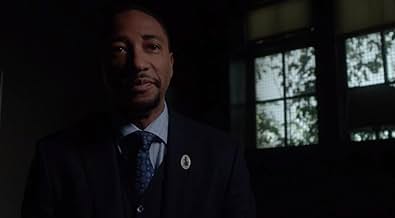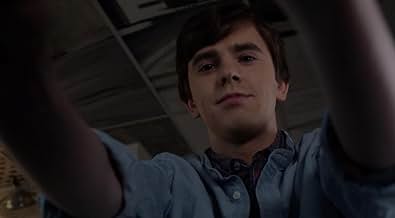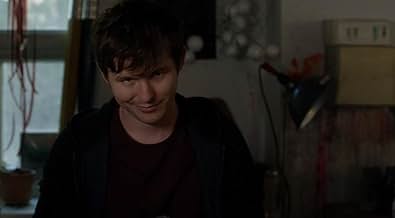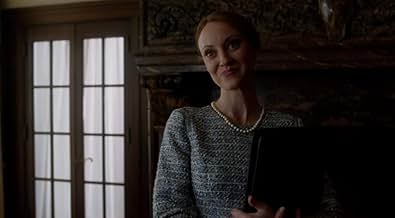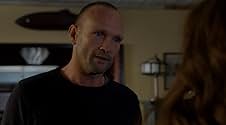There's No Place Like Home
- Episode aired Apr 25, 2016
- TV-14
- 43m
Norman returns home after making an unanticipated discovery; Norma takes on new projects; Dylan's search for Emma's mother leads to disturbing results.Norman returns home after making an unanticipated discovery; Norma takes on new projects; Dylan's search for Emma's mother leads to disturbing results.Norman returns home after making an unanticipated discovery; Norma takes on new projects; Dylan's search for Emma's mother leads to disturbing results.
- Director
- Writers
- Stars
- Director
- Writers
- All cast & crew
- Production, box office & more at IMDbPro
Featured reviews
The narrative fissures and Norma, while simultaneously tightening the thematic coil around identity, control, and the illusion of safety within the home
From the outset, "There's No Place Like Home" unfolds with a deliberate pacing that favors meticulous character study over shock tactics. This choice accentuates the layered performances, particularly Freddie Highmore's portrayal of Norman, who teeters at the precipice of self-awareness and manipulation. Within Pineview Psychiatric Hospital, Norman's interactions with Dr. Edwards and his therapist Jillian illuminate his duality: his insistence on sanity accompanied by a relentless, sociopathic charm that claws at the edges of his confinement. One standout moment occurs when Norman, over a meal with Julian, asserts his ability to manipulate others with cold calculation masked as sincerity. This scene epitomizes his chilling self-possession and calculated desire for freedom, executed with precise control by Highmore, whose nuanced performance captures the chilling complexity of a young man spiraling into madness while outwardly cloaked in charisma.
Parallel to Norman's psychological struggle, Vera Farmiga's Norma inhabits a fraught emotional terrain as she negotiates her conflicting loyalties: the tentative happiness found through marriage with Sheriff Romero (Nestor Carbonell) versus the enduring, maternal codependence with her son. The episode devotes substantial time to the evolution of Norma and Romero's relationship, notably illustrated in intimate scenes of their growing physical and emotional intimacy. Carbonell's direction here-his directorial debut-manifests in these moments of tenderness, characterized by warm lighting and soft camera work that contrasts sharply with the cold clinical atmosphere of Pineview. These juxtapositions reinforce the dual narratives of sanctuary and entrapment, love and suffocation, that ripple through the episode.
The narrative tension escalates as Norman pushes for release, weaving his case before Dr. Edwards and directly confronting Norma with unsettling truths about his perceptions of her new marriage. This confrontation is one of the episode's pivotal moments. Farmiga delivers a powerhouse performance, conveying a mother's anguish masked behind fierce denial and desperation. Her depiction of a woman utterly torn between self-preservation and unconditional love is profoundly humanizing, complicated by the knowledge that her denial will likely exact an irreversible toll. The scene's direction and editing favor close framing and lingering takes, amplifying the emotional intensity and capturing the subtle shifts in power and vulnerability.
Interwoven into the central drama are the episodic subplots that enrich the tightening universe of Bates Motel. Dylan's growing suspicion of Audrey, who remains mysteriously unaccounted for, introduces a shady undercurrent of mistrust and menace. Although these threads momentarily diffuse the episode's core focus, they contribute to the show's layered narrative architecture and foreshadow impending revelations. Some critics have noted these diversions could risk fragmenting the episode's cohesion, yet their inclusion remains thematically consonant with the pervasive atmosphere of paranoia and fragmentation that saturates the show.
"Themes of home, belonging, and the illusions therein find incisive articulation throughout the episode. The titular phrase 'There's No Place Like Home' becomes a haunting refrain, underscoring the idea that for the Bates family, home is less a refuge and more a crucible of psychological torment. The episode interrogates how the 'home' can serve simultaneously as a haven and a prison, reflecting Gothic tropes and echoing seminal works of psychological suspense that probe domestic instability as a source of horror." Through its structure and intimate focus, the episode situates Bates Motel within a broader televisual conversation that blends family melodrama with psychological thriller conventions.
Technically, Carbonell's direction deserves particular commendation. His capacity to balance pacing, mood, and character is evident in the episode's restrained yet taut atmosphere. Cinematography deftly manipulates light and shadow to enhance thematic resonances-the sterility of institutional interiors, the warmth of normative domesticity, and the encroaching darkness that threatens both. The editing works synergistically, shaping tension without rushing pivotal character moments, allowing emotional beats to settle and amplify.
Performance-wise, the brilliance of Highmore and Farmiga anchors the episode. Highmore's portrayal of Norman's oscillation between charm and menace is compellingly unsettling, particularly in scenes where his sociopathic tendencies flash through his veneer of vulnerability. Farmiga's Norma is equally powerful, conveying the intricacies of a mother whose love is as destructive as it is fierce. Carbonell's dual role as director and actor enriches the on-screen rapport between Romero and Norma, imbuing their scenes with subtlety and emotional authenticity.
The episode's sound design and score contribute to the brooding atmosphere, employing restraint to underscore psychological states rather than overwhelm. The musical cues during Norman's escape sequence and the closing shots walking back to the motel are particularly effective in evoking dread and anticipation.
While the episode's structural approach-leaning on slow unraveling rather than explosive revelations-has attracted some critique for pacing, the choice fosters a necessary buildup to the impending season climax. Its intimacy and psychological depth make it an essential chapter in Norman's descent and Norma's complicated maternal devotion.
Culturally and cinematically, "There's No Place Like Home" exemplifies Bates Motel's unique position as both homage and reinvention of Hitchcockian suspense. The episode invokes motifs familiar to fans of Psycho while expanding the mythos with contemporary psychological insights and serialized storytelling sophistication. The thematic focus on family trauma, the unreliable nature of perception, and the collapse of safety within domestic spaces resonate with literatures and visual arts probing the dark undercurrents beneath the American suburban idyll.
"There's No Place Like Home" is a meticulously crafted episode that integrates compelling performances, thoughtful directorial choices, and a psychologically rich script to deepen Bates Motel's imprint as a masterful modern thriller. It challenges viewers to confront the unsettling paradoxes of home and family-places of nurture that are also sites of profound dysfunction.
Did you know
- TriviaNorma's (Vera Farmiga) comment that she wants to build a fruit cellar is a reference to how her corpse is discovered in Psycho (1998). While looking for any sign of her missing sister, upon seeing Norman returning to the house, Lila Crane runs down to the fruit cellar in order to hide and finds Norma's mummified corpse.
- GoofsAll entries contain spoilers
- Quotes
Norman Bates: I know what you're doing.
Dr. Gregg Edwards: What am I doing?
Norman Bates: You're trying to scare me.
Dr. Gregg Edwards: Don't you think you should be scared, Norman? When you have these blackouts, you become a different person, Norman, you move differently. You speak differently. You experience the world differently. You have different impulses. Now, if that happened to me, I'd be scared.
Norman Bates: Well, I'm not you.
- ConnectionsReferences The Third Man (1949)
- SoundtracksBeyond the Sea
(La Mer) (uncredited)
Music by Charles Trenet
French lyrics by Charles Trenet
English lyrics by Jack Lawrence
Performed by Bobby Darin



